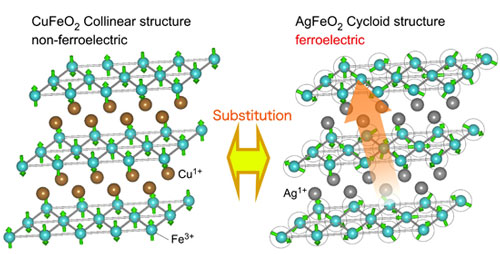| Aug 10, 2012 |
A new idea in the development of next-generation memory devices
|
|
(Nanowerk News) A research group headed by Dr. Noriki Terada, a Senior Researcher of the Neutron Scattering Group of the Quantum Beam Unit in the National Institute for Materials Science (NIMS) and Dr. Yoshihiro Tsujimoto, a ICYS-MANA Researcher of the NIMS International Center for Materials Nanoarchitectonics (MANA), in joint work with the Rutherford Appleton Laboratory and the University of Oxford, both in the U.K., discovered that magnetic and dielectric properties can be largely controlled by substituting other atoms for the nonmagnetic atoms in a magnetic material.
|
|
The magnetic dielectrics called multiferroics have attracted attention recently. Multiferroics are expected to be applied to a new type of memory devices in which dielectric polarization is controlled by a magnetic field and magnetization is controlled by an electric field, unlike the conventional technology, in which magnetization is controlled by a magnetic field and dielectric polarization is controlled by an electric field. In recent years, researchers around the world have searched for multiferroic materials which display gigantic ferroelectric polarization at room temperature. However, material development based on new ideas was needed, as multiferroic materials which function at room temperature are rare.
|
 |
|
Using the ultra-high pressure synthesis device at NIMS, the group led by Dr. Terada succeeded in synthesizing a high quality AgFeO2 specimen in which Ag ions are completely substituted for the nonmagnetic Cu ions in the delafossite oxide CuFeO2, and clarified the fact that the new material displays ferroelectric polarization in an environment without a magnetic field. The research group also carried out high resolution neutron diffraction experiments on AgFeO2 jointly with a group at the Rutherford Appleton Laboratory in the U.K. As a result, the crystal structure and spin structure of the material were revealed for the first time, and the mechanism of ferroelectric polarization was elucidated.
|
|
This research result is the first example in which multiferroic properties were successfully obtained by substituting other nonmagnetic ions for the nonmagnetic ions in a delafossite oxide, which gives a new concept to explorations of room-temperature multiferroic. This achievement is expected to make an important contribution to the development of next-generation large capacity memories and the development of new energy conversion materials.
|
|
This research was carried out with financial support from the “Young Researchers Overseas Visits Program for Vitalizing Brain Circulation” and the “Postdoctoral Fellowship for Research Abroad” program of the Japan Society for the Promotion of Science (JSPS). This result is scheduled to be published in the bulletin of the American Physical Society, Physical Review Letters.
|

